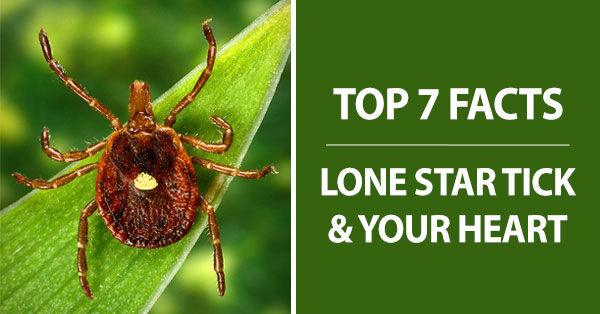Top 7 Facts: Lone Star Tick, Alpha-Gal Syndrome & Heart Valve Disease
Written By: Allison DeMajistre, BSN, RN, CCRN
Reviewed By: Adam Pick, Patient Advocate, Author & Website Founder
Page Last Updated: May 29, 2025
We received a great question from Laura, a patient who had surgical aortic valve replacement (SAVR) and an aortic aneurysm repair resulting from a congenital bicuspid aortic valve. Laura was recently bitten by the “lone star tick,” known to cause alpha-gal syndrome, a type of allergy. Laura asked, “Do you have any information about what happens to those of us with bovine or porcine valves if we develop the alpha-gal allergy? Are we at risk for becoming allergic to our valves?”

To help Laura and all the members of HeartValveSurgery.com community, here are seven important facts about the lone-star tick and the alpha-gal syndrome.
Fact 1: What is Alpha-Gal Syndrome (AGS)?
Alpha-gal syndrome (AGS) is an allergic reaction to a sugar found in red meat (beef, pork, lamb, and venison) and dairy products from cow’s milk. Chicken and fish do not have the alpha-gal sugar and are safe to eat if you have AGS. AGS can also be called alpha-gal allergy or “red meat allergy”.
Symptoms occur after people eat red meat or are exposed to other animal products containing alpha-gal. Among these animal products are heart valve tissue from cows, pigs, and/or horses. Heparin, a medication used during valve replacement surgeries, is made from pig intestines and can cause an allergic reaction when someone has AGS.
Fact 2: Only 42% Physician Awareness of Alpha-Gal Syndrome
Unfortunately, many physicians in the United States do not understand alpha-gal syndrome, and its symptoms are not always easily linked to the allergy. In fact, according to a CDC report, a nationwide survey reported that 42% of healthcare providers were unaware of AGS, and another 35% were not confident that they could diagnose or manage a patient with AGS.
Fact 3: Alpha-Gal Syndrome Cases Are On The Rise
Even though it’s still underdiagnosed and often misdiagnosed, the number of cases in the United States has gone from 12 in 2009 to over 34,000 in 2019. Many people who contract AGS with gastrointestinal (GI) symptoms will have a colonoscopy, endoscopy, and even cholecystectomy before they finally receive an accurate diagnosis. To date, there is no treatment or cure for AGS.
Fact 4: How Do You Get Alpha-Gal Syndrome? What Is The Lone Star Tick?
A person contracts AGS after being bitten by a tick. Saliva from the tick introduces alpha-gal into the bloodstream and manifests after eating red meat or being exposed to other animal products that contain the alpha-gal molecule.
The lone star tick, found throughout the eastern, southeastern, and south-central United States, is commonly thought to be the culprit that spreads AGS. However, alpha-gal reactions are now linked to at least nine other tick species found in the United States and other parts of the world, including:
- Blacklegged ticks (deer ticks)
- Asian long-horned ticks
- The Cayenne tick
Researchers also believe exposure to other parasites, including roundworms, chiggers, and mites, can also sensitize people to alpha-gal. Repeated tick bites can cause a rise in alpha-gal, so even if you’ve had previous tick bites and didn’t develop AGS, future bites can trigger the syndrome’s onset.
Fact 5: What Are The Symptoms of Alpha-Gal Syndrome?
Unlike other allergies, AGS reactions are usually delayed three to eight hours after eating red meat. However, some reactions can be immediate, including after consuming pork kidneys, drug infusions, and medical products that contain beef gelatin.
A hallmark of AGS is nighttime abdominal pain, rash, and swelling after eating red meat for dinner. Often, people think the symptoms are due to food poisoning.
A typical first symptom of AGS is itching of the palms and soles of the feet. Other common symptoms include:
- Itching
- Hives
- Flushing of the skin
- Swelling of palms and soles of feet
- GI upset
About 60% of cases have anaphylactic reactions and are life-threatening. These can include:
- Low blood pressure
- Dizziness
- Rapid heartbeat
- Loss of consciousness
- Shortness of breath
- Wheezing
- Chest Tightness
- Coughing
- Difficulty breathing
Anaphylaxis is a medical emergency and requires immediate medical attention!
Fact 6: How is Alpha-Gal Syndrome Diagnosed?
You should notify your physician or an allergist if you have any symptoms after eating meat products. Unfortunately, unlike most tick-borne illnesses, the onset of AGS takes at least 4-6 weeks from the tick bite, and often people don’t recall being bit.
Your doctor should be able to diagnose AGS based on your clinical symptoms. These can include:
- AGS symptoms after eating meat with no previous symptoms
- Reactions that include itching, hives, swelling, or anaphylaxis
- GI upset
- Reactions 3-8 hours after eating meat
- Positive testing for alpha-gal IgE
- Symptom improvement when adhering to a meat-free diet
Fact 7: What Does an Alpha-Gal Syndrome Diagnosis Mean for Heart Valve Disease Patients?
We can answer this question in two parts. What does the diagnosis mean for patients with bioprosthetic heart valve? What does the diagnosis mean for those who need heart valve surgery?
Patients with a bioprosthetic valve
We could not find any documentation of patients with a bioprosthetic heart valve who contracted AGS and had a severe allergic reaction. However, the complication doctors do see with bioprosthetic heart valve patients diagnosed with AGS is earlier than expected valve degeneration. They also note that AGS may accelerate coronary artery disease. It’s still an evolving area of research without a lot of long-term data.
Patients who need a bioprosthetic valve.
It is still possible to receive a bioprosthetic valve if you have AGS. According to the American Academy of Allergy Asthma and Immunology, there are scenarios where patients have an acute reaction during valve replacement surgery but can be treated through the reaction with steroids and other medications to minimize allergic response. However, the valve may still be subject to early degeneration over time.
There is also the factor of heparin, a blood thinner surgeons use during surgery derived from pigs and known to elicit an allergic reaction to alpha-gal. The solution is to use heparin in moderation whenever possible and continue to pre-medicate with steroids and other anti-allergy medications during surgery.
Another interesting solution to making heart valve replacement safer for patients with AGS is the “GalSafe Pig,” a genetically modified pig that doesn’t produce the alpha-gal molecule, making it safe for tissue donation and consumption without an allergic response.
The Key Takeaway
Tick bites and alpha-gal syndrome should be a concern of anyone with a heart valve or needing one. There are some key things to know about ticks and how to avoid them. Researchers believe the lone star tick is the most important one to avoid when it comes to AGS. Remember these essential facts about the lone star tick so you can keep your distance and stay safe:
- They like forests and forest edges.
- They are active year-round but bite more commonly in late spring and early fall.
- Deer are their primary host.
- Lone star ticks can detect your odor and travel several yards to find and attach to you.
- Long pants, long-sleeved shirts, permethrin-treated clothing, and tick repellent can protect you.
You can find more information about AGS on at the following resources:




